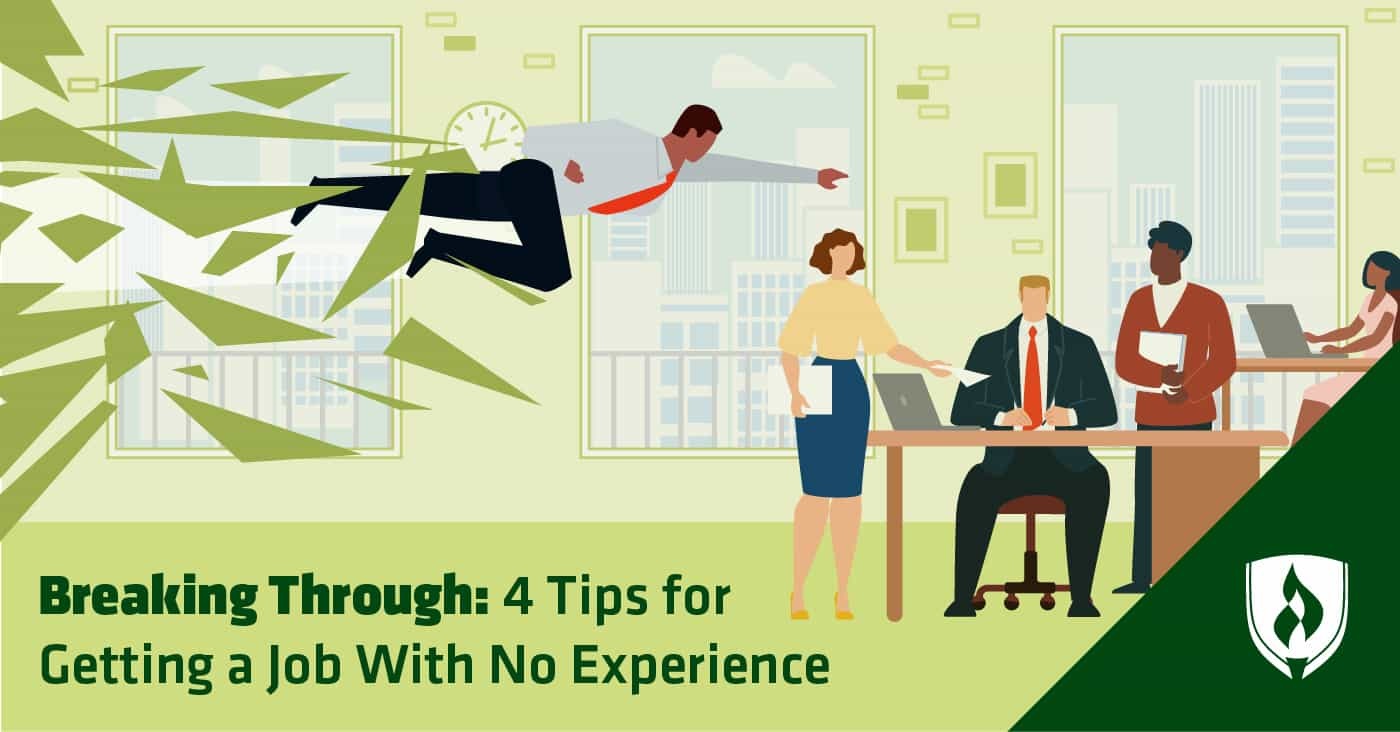
It’s a classic conundrum. You seemingly need a job to build relevant experience, but it also seems like every job posting out there is looking for candidates with experience. So, what’s the secret to starting out and getting past this frustrating catch-22 of a scenario? While you won’t walk into a CEO position right out of school, there are plenty of ways to improve your chances of landing relevant jobs with little or no experience.
We talked with Melissa Wagner, Career Services Manager at Rasmussen College, to highlight her tips for getting a job with no experience. If you’re new to the workforce or are looking to change careers, this article will give you practical advice on how to improve your job search, resume writing skills, networking ability and more.
4 Ways to improve your chances of getting a job with no experience
Job searching can be frustrating for anyone, but when you’re new to the field, it can be all the more difficult. As you explore new opportunities, consider these tips to help you stand out.
1. Highlight your transferable skills
While you may not have much experience in your field, you do have something employers find valuable: transferable “soft” skills like communication, digital fluency, and collaboration.
"There are lots of things you can bring to the table that have nothing to do with industry-specific experience," Wagner says.
Working at a fast-food restaurant, for example, may have nothing to do with your professional aspirations, but it can show that you understand customer service in a fast-paced environment. As you think about the various experiences you’ve had, consider what soft skills you’ve developed and include them on your resume. Being able to communicate and work on a team are often just as important as industry knowledge.
“Employers tell us more often than not, we can train you all day long on our systems … [but] what we can't train you on are those intangibles and transferable skills,” Wagner says.
It might take a little creativity, but seek out ways to highlight some of these traits—did you lead a group project? Solve a problem at work? Even if it feels like a minor thing, highlighting your thought process during an interview can help ease employers’ concerns about your capacity to adapt to new systems and duties.
2. Lean on your network
“Networking is absolutely essential,” Wagner says.
By leaning on your professional contacts, you can both find potential jobs and gain valuable insight in your search for employment.
As an introvert, Wagner knows networking isn’t easy for everyone, so she suggests “starting at home.” Reach out to your family and friends first. Even if they don’t work in your industry, they can offer advice and brainstorm some of your skills that you may have overlooked. The next step, Wagner says, is reaching out to your instructors. Do your best to build good relationships with them during your courses. While it’s no guarantee, they are likely to have connections within the industry and may be willing to help out with things like letters of recommendation or a reference.
“It's hard for people to put themselves out there,” Wagner says, “but don't be afraid.”
Wagner also suggests taking advantage of LinkedIn®. This platform is a great way to connect with your network online and become visible to recruiters. When it comes to reaching out to new connections, she recommends taking a mentorship approach.
“Networking is a two-way street,” she says.
Rather than asking people to help you get a job at their company, try setting up informational interviews and asking how others got their start in the field. Not only will this help you better understand the industry, but Wagner suggests it is more professional and may ultimately lead to more fruitful connections. You might be surprised at how much help people are willing to help—but they were likely in your shoes not that long ago and can empathize. Worst case? It’s another rejection, and that’s something that just comes with the territory of job hunting.
3. Start applying early
“The earlier you start the better,” Wagner says.
Don’t wait until after graduation to start looking for opportunities in your field. You can begin to explore part-time jobs, internships, volunteer positions and more. They don’t even need to be directly related to the job you ultimately want. Wagner says just getting your toes wet in the industry can impact your job search later—as well as begin to build your network.
“Job searching is a marathon, not a sprint,” she says.
If you’ve already graduated, don’t worry! There are plenty of other tips to help you get ahead of the game.
Wagner suggests applying to jobs within the first 10 days of their posting date. While this isn’t a hard and fast rule, it can help prevent wasting effort on a posting that’s already in the selection process. It’s also important to remember that many job postings use software to filter resumes. So, if you’re too late in applying or don’t provide enough information, your application may automatically be booted.
“Don't instantly assume it's your experience that’s the problem,” Wagner says.
Make sure to be timely and thorough in your application process, and even then, remember that there are many other factors considered other than your experience. It may just take some persistence, but Wagner assures that the effort will pay off. Having patience, she says, is one of the most important skills in any job search.
4. Know when you need more education
“If you find yourself stuck in a similar position over and over and over again, then maybe you want to think about continuing your education to gain more skills and to elevate yourself to the next level,” Wagner advises.
While experience isn’t everything, sometimes it’s necessary to return to school to gain more expertise in your field.
If you’re noticing that all the job postings you want require a higher degree level, consider doing some more research. Wagner suggests using the Bureau of Labor Statistics and O*NET Online to find helpful information on educational paths as well as projected job growth, salary information and more.
It’s a marathon, not a sprint
The job search may be frustrating at times but it’s important to remember that everyone starts out with no experience. Above all, Wagner reminds students they are not alone. Even if you’re getting rejections, there are plenty of ways to improve your tactics and stand out in your field.
For more tips and advice for navigating your employment search, check out our article “Importance of Networking: Experts Reveal Their Best Advice for Young Professionals.”




